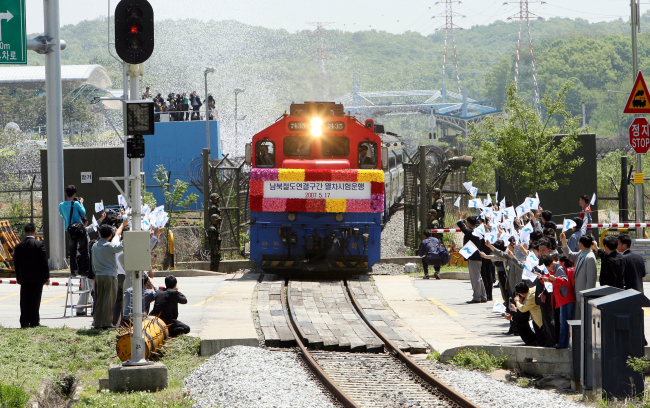School trip to Pyongyang? Parties rush to make NK-related pledges ahead of local elections
By Claire LeePublished : May 1, 2018 - 17:42
After last week’s historic inter-Korean summit, political parties are making North Korea-related pledges, ranging from tour packages to the North’s Kumgangsan to inter-Korean sports exchanges, ahead of the June 13 local elections.
Lee Jae-myung of the ruling Democratic Party of Korea, who is running for Gyeonggi Province governor, pledged to designate the northern region of Gyeonggi Province, which shares a border with North Korea, as a “unification economy zone.”
The former Seongnam mayor also shared his vision to contribute to the two Koreas’ future projects to restore now-defunct railways, especially the Gyeongui Line -- which connects Seoul and Sinuiju, a North Korean city that faces China across the border of the Yalu River.
Lee Jae-myung of the ruling Democratic Party of Korea, who is running for Gyeonggi Province governor, pledged to designate the northern region of Gyeonggi Province, which shares a border with North Korea, as a “unification economy zone.”
The former Seongnam mayor also shared his vision to contribute to the two Koreas’ future projects to restore now-defunct railways, especially the Gyeongui Line -- which connects Seoul and Sinuiju, a North Korean city that faces China across the border of the Yalu River.

Another ruling party member running for Busan mayor, Oh Geo-don, promised to launch a support program so that more Busan-based shoe manufacturers can operate in the Kaesong industrial park in the North, which has been shut down since February 2016 but whose operations are expected to resume following last week’s inter-Korean summit.
Jeju Self-Governing Province Gov. Won Hee-ryong, a prominent politician running for re-election as an independent candidate, has pledged to develop a special tour program incorporating visits to both the North’s Kumgangsan and Hallasan on Jeju Island. The two mountains are popular tourist spots in their respective countries. A South Korean firm had invested in the development of the Kumgangsan Tourist Region, allowing South Korean tourists to visit there until 2008 when the Lee Myung-bak administration suspended all tours after a South Korean civilian was shot and killed.
Won has also pledged to organize public forums where speakers from the North can participate. Jeju Island, in fact, has a number of connections with North Korea. Many ethnic Koreans living in Japan, who have close ties with North Korea, are descendants of former Jeju Island residents who had moved to Japan during Japan’s 1910-45 colonial rule of Korea.
Many became North Korean sympathizers after receiving financial and educational assistance from the North Korean regime in the 1950s-1970s. It is believed that some 93,340 ethnic Koreans in Japan moved to North Korea from the late 1950s to the early 1980s, as part of Tokyo and Pyongyang’s joint repatriation program. North Korean leader Kim Jong-un’s mother, Ko Yong-hui, was born in Japan to ethnic Korean parents, and her family settled in North Korea through the repatriation program in the early 1960s.
Although Hong Joon-pyo, the chairman of the main opposition Liberty Korea Party, is fiercely critical of the inter-Korean summit and has accused President Moon Jae-in of “accepting North Korea’s demands without achieving any goals,” some members of his party have come up with pledges that involve North Korea as well.
Yoon Seung-geun, a Liberty Korea Party member and county governor of Goseong, Gangwon Province, has pledged to designate and brand the county as a special self-governing area for future cultural and economic exchanges with the North. Goseong was under North Korean rule before the 1950-53 Korean War and lies immediately south of the demilitarized zone.
Busan Mayor Suh Byung-soo, also a member of the main opposition party, has pledged to invite North Korean athletes should he make a successful bid to host the 2020 World Team Table Tennis Championships in Busan.
Those who are running for the seats of superintendents of education, including Min Byung-hee, the superintendent of education in Gangwon Province, have pledged to arrange school trips to North Korea.
“It almost feels like we are now living in a different era,” said an office worker in Seoul surnamed Kim.
“So many things have changed since the summit last week. It’s nice to see that the pledges for the local elections reflect such changes already. Personally I would love to visit North Korea by train.”
Park Sang-byung, a political commentator, said he thinks positively of the pledges, regardless of whether or not they can actually be implemented.
“After the summit, there is no question that we need to come up with new measures and policies when it comes to how to work and deal with North Korea, and there is no question about that,” he told The Korea Herald.
“So I think it‘s a good thing that politicians are at least coming up with their own agendas and plans at this stage. And once the ruling party and opposition parties compete against one another with their pledges and policies, I think it will only make things better. What we need is a lot of ideas and healthy competitions to fuel creativity and motivate those in charge to do their best.”
Eight mayors of big cities, including Seoul and Busan, and nine provincial governors will be chosen at the June 13 local elections.
By Claire Lee (dyc@heraldcorp.com)







![[KH Explains] How should Korea adjust its trade defenses against Chinese EVs?](http://res.heraldm.com/phpwas/restmb_idxmake.php?idx=644&simg=/content/image/2024/04/15/20240415050562_0.jpg&u=20240415144419)










![[Today’s K-pop] Stray Kids to return soon: report](http://res.heraldm.com/phpwas/restmb_idxmake.php?idx=642&simg=/content/image/2024/04/16/20240416050713_0.jpg&u=)